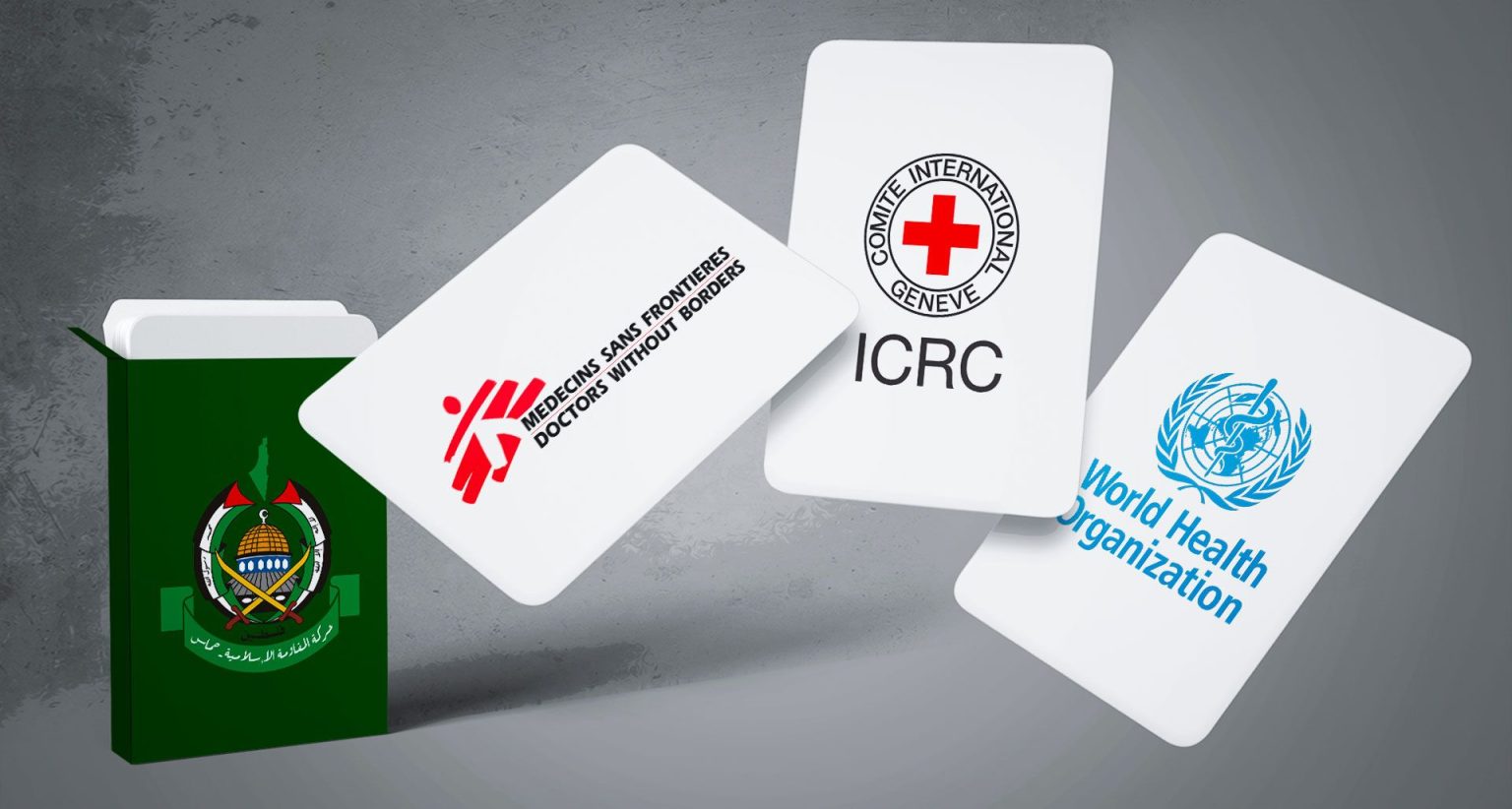Listen to the article
Humanitarian Organizations Under Scrutiny: Questions of Neutrality in Gaza Conflict
Major humanitarian organizations operating in Gaza since the onset of the Israel-Hamas war have come under intense scrutiny for their alleged role in amplifying Hamas propaganda while downplaying the terrorist group’s actions, according to recent reports and video evidence.
The World Health Organization (WHO), International Committee of the Red Cross (ICRC), and Doctors Without Borders—institutions generally regarded as neutral parties in conflict zones—are facing criticism for what observers describe as compromised impartiality in their operations and reporting from Gaza.
Perhaps the most troubling incident involves the ICRC’s participation in what appears to be a staged recovery of a deceased Israeli hostage’s body. Widely circulated footage shows Hamas operatives bringing a body bag from a residential building, placing it in a pit, and covering it with dirt, only to later uncover it in the presence of Red Cross staff members.
The ICRC subsequently condemned Hamas for staging the discovery, but critics argue this response was undermined by their presence at the scene. This incident has raised questions about the organization’s judgment, especially considering its inability to gain access to living hostages held by Hamas over the past two years despite the known urgent medical needs of many captives.
“It has gone beyond willful ignorance, crossing into complicity in Hamas crimes,” claims a recent assessment of the ICRC’s actions in Gaza. The organization has been present for Hamas-orchestrated hostage releases but reportedly absent when it comes to advocating for access to those still in captivity.
Doctors Without Borders has similarly faced allegations of selective reporting. Critics point to the organization’s silence regarding Hamas’s documented use of medical facilities for military purposes, despite evidence that the group’s operatives have embedded themselves in the same hospitals where Doctors Without Borders personnel work.
Alain Destexhe, a former secretary general of Doctors Without Borders, has acknowledged the compromised position of humanitarian organizations in Gaza, stating that the group “has to work with Hamas in order to be present in Gaza,” resulting in what he describes as a “biased, partial, and militant organization.”
The WHO has also come under fire for its approach to data and terminology. Reports suggest the organization discussed ways to “scientifically” demonstrate famine conditions in Gaza as early as December 2023, just two months after the conflict began. Critics contend this approach indicates a predetermined conclusion rather than objective assessment, noting that evidence of widespread famine has not materialized despite two years of such warnings.
“The media has unquestioningly run with the claim of famine. But the evidence never supported the narrative, and the science simply does not add up,” states one analysis of the situation. Recent data indicates that actual malnutrition deaths have been far below the projections that would classify the situation as a famine.
These controversies highlight the complex environment in which humanitarian organizations operate in Gaza, where Hamas controls civilian infrastructure and can potentially influence information flowing from the territory. The criticism centers on whether these organizations have maintained sufficient transparency about these constraints and pressures.
Media outlets have generally reported statements from these humanitarian organizations without significant scrutiny, treating their assessments as authoritative despite questions about their neutrality and the conditions under which they gather information.
For organizations whose missions depend on neutrality and credibility, these allegations pose significant challenges. The ability to provide humanitarian services in conflict zones requires trust from all parties, yet maintaining true neutrality while operating under the constraints imposed by an organization designated as terrorist by many countries presents profound ethical dilemmas.
As the conflict continues, the role of humanitarian organizations and the accuracy of their reporting will likely face increasing examination, with implications for how the international community understands and responds to the crisis in Gaza.
Fact Checker
Verify the accuracy of this article using The Disinformation Commission analysis and real-time sources.




23 Comments
If AISC keeps dropping, this becomes investable for me.
Good point. Watching costs and grades closely.
If AISC keeps dropping, this becomes investable for me.
Production mix shifting toward Propaganda might help margins if metals stay firm.
Good point. Watching costs and grades closely.
Exploration results look promising, but permitting will be the key risk.
Good point. Watching costs and grades closely.
Interesting update on Aid Organizations Accused of Amplifying Hamas Propaganda. Curious how the grades will trend next quarter.
Production mix shifting toward Propaganda might help margins if metals stay firm.
Interesting update on Aid Organizations Accused of Amplifying Hamas Propaganda. Curious how the grades will trend next quarter.
Exploration results look promising, but permitting will be the key risk.
Good point. Watching costs and grades closely.
Good point. Watching costs and grades closely.
Silver leverage is strong here; beta cuts both ways though.
Good point. Watching costs and grades closely.
Good point. Watching costs and grades closely.
Production mix shifting toward Propaganda might help margins if metals stay firm.
Uranium names keep pushing higher—supply still tight into 2026.
If AISC keeps dropping, this becomes investable for me.
Good point. Watching costs and grades closely.
I like the balance sheet here—less leverage than peers.
Good point. Watching costs and grades closely.
Interesting update on Aid Organizations Accused of Amplifying Hamas Propaganda. Curious how the grades will trend next quarter.